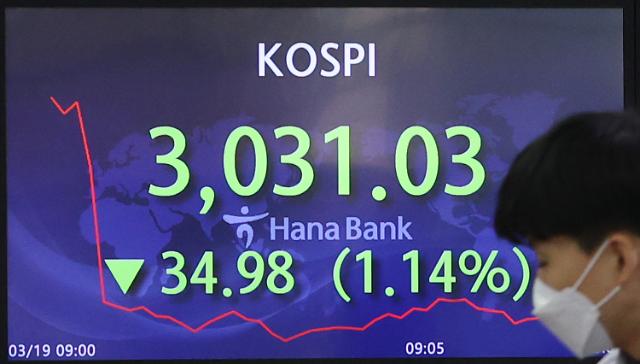KOSPI closes a slight drop of 0.48% over the past week
Economically sensitive stocks pay attention to rising government bond yields exceeding 1.7%

[사진=연합뉴스]
This week (March 22-26), as expectations for earnings in the first quarter continue to rise, rising pressure on market interest rates is expected to act as a variable. It is recommended to maintain interest in economically sensitive stocks as it is expected that the interest rate rise will continue for the time being.
According to the Korea Exchange on the 21st, the KOSPI this week ended at 3059.53, down 14.86 points (0.48%) from last week.
Foreigners net sold 8648 billion won for one week (15-19 days), and institutions sold 1.44 trillion won. Among the institutions, pension funds sold 4565 billion won, but the net selling march stopped for 52 consecutive trading days. Individuals net bought 2,3129 billion won.
The global stock market fell again as the U.S. long-term Treasury bond rate, which had fluctuated between 1.5% and 1.6% in the beginning of last week, broke 1.7% in the second half of the week. The Fed seemed to have a positive effect on the stock market by alleviating doubts related to monetary policy tightening, but investment sentiment declined in the aftermath of a surge in US 10-year Treasury bond yields and a plunge in international oil prices. In this situation, the industry believes that next week’s domestic stock market is also likely to be affected by the US long-term Treasury yield.
NH Investment & Securities forecasts the KOSPI weekly band next week at 2950-3150 points. Labor-gil, NH Investment & Securities researcher, also cited rising market interest rates as a threat to the KOSPI next week. Researcher Roh explained, “For the time being, the stock market may react sensitively to changes in US market interest rates, but we believe that the decline in the valuation level of US growth stocks and confidence in the economic recovery will provide downward stiffness in the index.”
However, they analyzed that there is plenty of room for positive interpretation, given that the valuation burden has eased as the KOSPI has recently been adjusted and earnings estimates for KOSPI companies are being raised. Researcher Roh added, “As we are also raising our earnings forecasts for exports to the US, such as semiconductors and automobiles, it will be effective to construct a portfolio focused on economically sensitive stocks, while maintaining the proportion of large-cap stocks,” he added.
Korea Investment & Securities forecasts that the KOSPI will rise gradually next week in the range of 3040 to 3140 points. Dae-Joon Kim, a researcher at Korea Investment & Securities Co., said, “The 10-year US bond rate has been decreasing since February, and the US stock market is also adapting to rising interest rates unlike two weeks ago.” It doesn’t work, but there is a high possibility that this trend will continue in the future.” In addition, researcher Kim said, “Since the Fed Chairman Powell relieved market anxiety over monetary tightening, investors can see the rise in interest rates as a sound response to the recovery of economic fundamentals. He added that the approach to economically sensitive stocks such as industrial goods will still be effective.”
©’Five Languages Global Economic Daily’ Ajou Economics. Prohibition of unauthorized reproduction and redistribution
